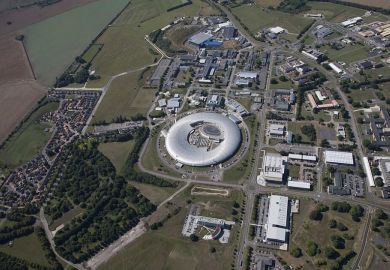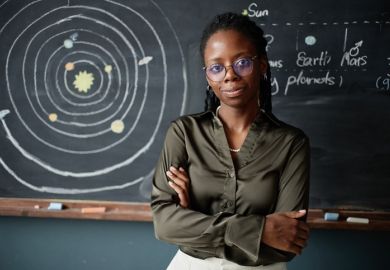Victoria Kaspi is an astrophysicist and expert on neutron stars – the ancient remnants of the most massive stars in the Milky Way. She is professor of physics and director of McGill University’s Space Institute. In February, she was awarded the Gerhard Herzberg Canada Gold Medal for Science and Engineering by the Natural Sciences and Engineering Research Council of Canada, the nation’s top science prize. Professor Kaspi is the first woman and one of the youngest researchers to win the award.
Where and when were you born?
Austin, Texas in the US in 1967.
How has this shaped you?
We left Austin when I was two years old, so I do not think it shaped me much, apart from the fact that I was born there because my father was doing his PhD at the University of Texas. In other words, there was already some tradition of academia in my family.
What were your immediate reactions to winning the award?
Shock and astonishment!
What is the significance of winning such an award?
To me, the primary significance is of the importance placed on basic, undirected research here in Canada. It signals that research such as astrophysics is valued by our country.
Some have remarked that your being the first woman to win this award reflects the gender imbalance still prevalent in Canadian higher education. Do you think this true?
It certainly reflects the great gender balance that existed in the past. The award is usually given to someone fairly senior in the field, [someone] who started their career decades earlier. That I am the first woman is a reflection of the lack of gender balance decades earlier. That is not to say that there is good gender balance today – there isn’t – but it has improved, so it seems reasonable to expect the fraction of women winning this award, and others like it, will increase.
What needs to be done to redress the balance?
Action is required at many different levels in the development stages of researchers – from elementary school right up to promotion to full professor. The nature of the action depends on the stage. In academia, we can make the environment friendlier to women, both in highly tangible ways like ensuring easy access to maternity leave and flexibility in schedules, and in less tangible ways like consciousness-raising among both genders regarding subtle (and not-so-subtle) forms of gender bias.
How do you view Canada’s position in global higher education?
I believe we punch above our weight in terms of research impact, for example, citations per capita. I know that to be true in astrophysics. I am also certain that our top universities are highly attractive to undergraduates and graduate students worldwide.
If you weren’t an academic, what do you think you’d be doing?
I might be working in some sort of national lab doing research, or perhaps as a researcher in a high-tech company.
What has changed most in global higher education in the past five to 10 years?
There has obviously been a huge technological revolution that affects nearly every aspect of higher education; there are many more ways of getting information and of interacting than there used to be. Students now email professors, discuss course material in chat rooms, can search the internet for relevant information, and importantly, can be distracted by an overload of information far more easily. These are profound changes that will have a huge impact on education for many years to come.
What advice would you give to your younger self?
I would tell myself to have more confidence, that I am indeed cut out to be a physicist, and not to spend so much time questioning this.
What are the best and worst things about your job?
There are two “best” things: one is that feeling of sudden understanding when you discover something that clearly explains one or more long-standing puzzles; two is watching your students learn and grow and turn into scientists in their own right. The worst thing about the job is trying to juggle a thousand challenging tasks at once.
What do you do for fun?
In the past few years, I have taken part in my kids’ school plays, which have traditionally had parents on stage, acting with the kids. I would never have guessed how much fun that could be, nor how much I enjoy singing and dancing in front of an audience!
What advice do you give to your students?
I advise them to work hard but enjoy what they do, and to always think critically and not take any scientific claim at face value.
What kind of undergraduate were you?
I was hard-working and probably a little annoying to some of my professors, as I liked to ask a lot of questions in class. Nevertheless, I could not have been too annoying as my undergraduate school [McGill University] ended up hiring me back.
What is the biggest misconception about your field of study?
That we stare with our bare eyes through little optical eyepieces attached to giant telescopes to do our observations!
If you were Canada’s higher education minister for a day, what policy would you immediately introduce to the sector?
I would immediately introduce a “target of opportunity” funding programme, wherein scientists could on short notice [submit a request for] funding to take advantage of some new opportunity, rather than have to wait months to years for the next formal funding application deadline. Doing world-class science means being aware of research results around the world and, crucially, being able to react to them in a way that leads to progress.
Appointments
Tania Lima has been appointed King’s College London’s director of global engagement. She was previously assistant director of programmes and operations at the UK HE International Unit. At King’s, where she began work last week, Dr Lima is responsible for directing the global engagement team, and offering advice and support to the academic and professional services community on overseas partnerships. She will also help to deliver the institution’s international strategy alongside colleagues in King’s Worldwide – the university’s international hub.
David Crow has been named pro vice-chancellor and head of colleges for Camberwell, Chelsea and Wimbledon at the University of the Arts London. Professor Crow, currently pro vice-chancellor and dean of the Manchester School of Art at Manchester Metropolitan University, will take up his position in August. “I am pleased to be able to play my part in shaping the future of UAL and its colleges, whose students and alumni have such influence on art, design and performance across the world,” he said. Nigel Carrington, UAL’s vice-chancellor, said that he was “delighted” to have appointed a “leading figure in his generation of creative academics”.
Alison Britton, professor of healthcare and medical law in Glasgow Caledonian University’s School for Business and Society, has been reappointed convener of the Law Society of Scotland’s health and medical law subcommittee.
Andrew Linn has been named dean of the Faculty of Social Sciences and Humanities at the University of Westminster. He joins from the University of Sheffield, where he was professor of the history of linguistics.
Dame Glynis Breakwell, vice-chancellor of the University of Bath, has been appointed by the Cabinet Office to the committee that reviews nominations made for national honours (such as knighthoods and damehoods) in science and technology.
POSTSCRIPT:
Print headline: HE & me
Register to continue
Why register?
- Registration is free and only takes a moment
- Once registered, you can read 3 articles a month
- Sign up for our newsletter
Subscribe
Or subscribe for unlimited access to:
- Unlimited access to news, views, insights & reviews
- Digital editions
- Digital access to THE’s university and college rankings analysis
Already registered or a current subscriber?






